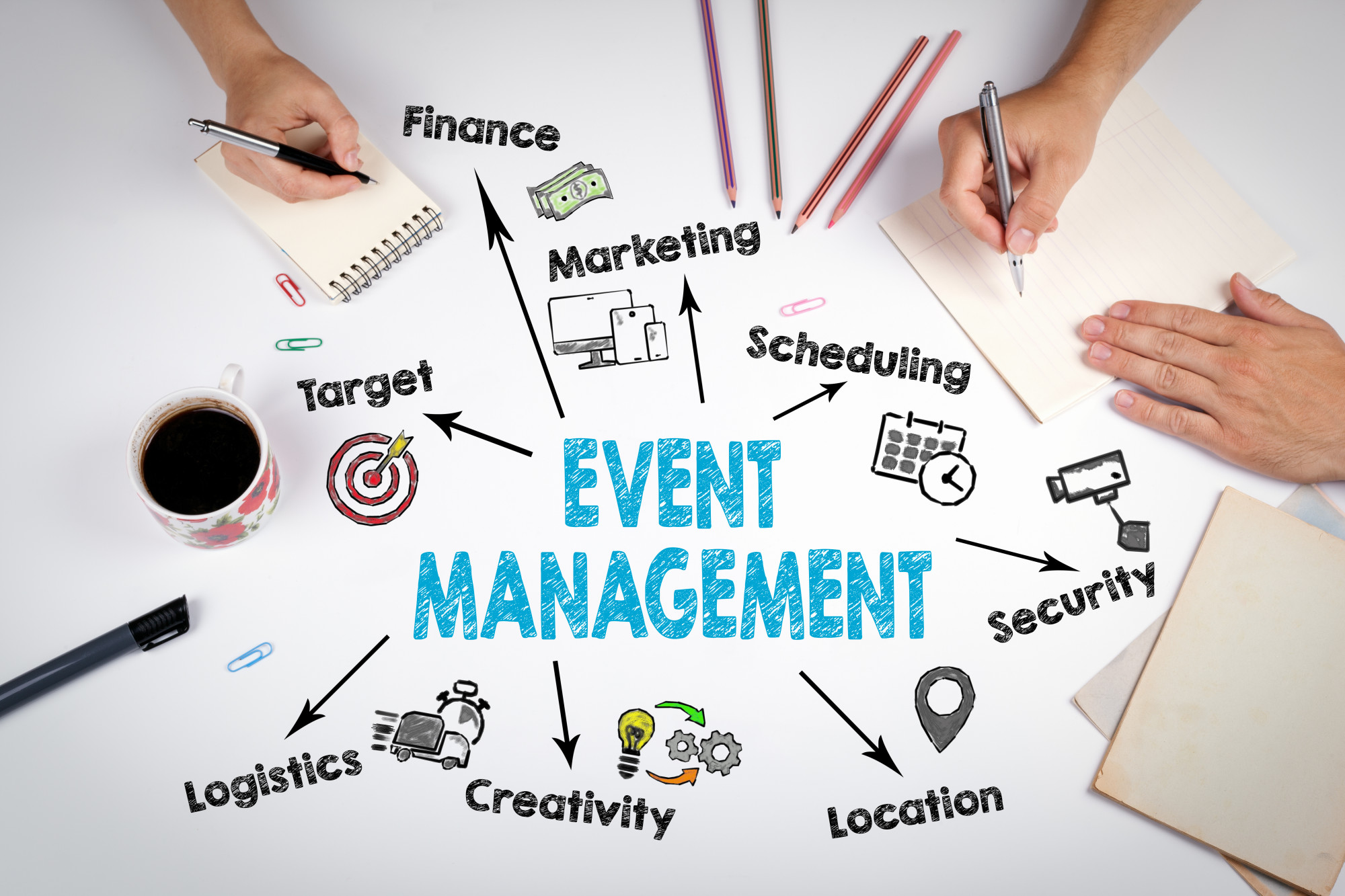Why charlotte event companies are ideal for special life moments
Wiki Article
A Deep Study How Event Management Functions to Create Remarkable Experiences
Event management is an intricate self-control that incorporates numerous components to craft extraordinary experiences. It needs a clear understanding of the event's objective and target market. Organizers must navigate budgeting, logistics, and advertising and marketing to ensure a seamless execution. Each part plays a crucial function in attaining the preferred influence. However, the journey does not end with the event itself. There are insights to discover that can form future ventures.The Fundamentals of Event Management
Efficient event management incorporates a variety of vital concepts that guide the planning and implementation of effective events. At its core, it entails understanding the event's function, audience, and preferred end results. Identifying the target market is essential, as it informs decisions connected to web content, marketing, and logistics.Budgeting is an additional essential aspect, guaranteeing that sources are designated successfully while meeting the event's objectives. This consists of planning for unexpected costs that might develop.
Time management plays a vital duty, as event managers must develop an in-depth timeline to work with numerous jobs and landmarks.
Furthermore, efficient communication among stakeholders, vendors, and team members is necessary to assure placement and prevent misconceptions.
Risk management have to be thought about, with contingency strategies in location to deal with potential obstacles, consequently improving the overall experience for attendees and ensuring a seamless implementation of the event.
Secret Functions in Event Planning
In event preparation, comprehending crucial functions is important for effective execution. The event organizer is accountable for looking after logistics and ensuring all facets align with the vision. In addition, efficient supplier management is crucial for maintaining high quality and fostering strong partnerships throughout the planning process.Event Planner Obligations
An event coordinator coordinates the intricate aspects of event planning, making certain smooth execution from fertilization to final thought. They are accountable for conceptualizing the event motif, setting spending plans, and creating timelines to maintain the task on the right track. Coordination with stakeholders, including customers, place managers, and volunteers, is crucial to align assumptions and facilitate interaction. The organizer additionally supervises logistics, such as catering, transportation, and modern technology requires, guaranteeing all elements operate harmoniously. They conduct website brows through, manage routines, and troubleshoot concerns that might arise during the event. Post-event, the planner reviews the event's success, gathering feedback and evaluating results to notify future jobs. This diverse duty needs strong business abilities, interest to detail, and efficient social interaction.Supplier Management Basics
Guiding with the landscape of vendor management is necessary for effective event preparation. Effective vendor management involves identifying, selecting, and coordinating providers who offer vital solutions, such as food catering, audiovisual assistance, and decor. Event organizers need to preserve strong communication with suppliers to assure that all elements line up with the event's vision. Secret roles include the supplier supervisor, who oversees agreements and arrangements, and the logistics organizer, in charge of on-site setup and execution. It's vital to establish clear assumptions and timelines, cultivating a collective environment that boosts the general experience. By prioritizing these components, event coordinators can navigate possible difficulties, guaranteeing that every detail adds to a smooth and unforgettable event.Crafting a Vision: Idea Advancement

As soon as a vision is established, it ends up being important to equate it into workable elements. This includes specifying the environment, selecting proper places, and determining the event's style. Working together with stakeholders, consisting of sponsors and companions, additionally improves the principle, making sure that all events share a linked understanding of the event's purpose. Ultimately, a strong vision not just enhances participant engagement yet additionally sets the stage for memorable experiences that resonate long after the event ends.
Budgeting and Source Allotment
With a clear vision in location, the following action in event management entails mindful budgeting and source appropriation. This crucial stage assurances that all necessary parts are funded and aligned with the event's objectives. Event managers begin by estimating expenses connected with location selection, food catering, entertainment, and advertising. They click this link produce a detailed spending plan that lays out each group, allowing for openness and accountability.Source appropriation extends beyond financial resources; it likewise includes human sources. Determining group functions, obligations, and timelines is necessary to ensure effectiveness. Event managers should likewise think about backups for unforeseen expenditures or modifications in scope, developing a barrier within the budget.
Focusing on spending on components that enhance visitor experiences is important. By strategically alloting resources, event supervisors maximize impact while preserving monetary control. This disciplined strategy not just fosters successful occasions but likewise develops reputation and depend on with stakeholders and individuals.
Logistics: The Foundation of Event Implementation
While budgeting lays the groundwork for an event, logistics offer like this as its backbone, assuring that every element is carried out smoothly and effectively. charlotte event companies. This incorporates a vast array of tasks, including location selection, transport arrangements, and devices purchase. Effective logistics management calls for precise planning and control to assure that all aspects line up with the event's timeline and purposesTrick elements of logistics include inventory management, where products and products are tracked to stop lacks, and staffing, which involves recruiting and training employees to take care of various tasks. Communication is also critical, as it assists in collaboration among suppliers, enrollers, and the event group.

Advertising And Marketing and Promo Strategies
Effective marketing and promotion techniques are crucial for making the most of attendance and engagement at an occasion, as they generate rate of interest and enjoyment amongst potential participants. Event managers employ a mix of typical and electronic advertising and marketing strategies to reach their target market. Social network platforms, e-mail campaigns, and targeted advertisements are commonly utilized to create buzz and foster community interaction. Partnerships with influencers or market leaders can improve reputation, while involving content such as video clips and testimonies can resonate with potential participants.On top of that, leveraging event-specific hashtags and producing shareable graphics motivates organic promo among attendees. Early riser ticket offers and exclusive promotions can incentivize registration, in addition improving interest. A properly designed site that offers simple navigation and clear details about the event can boost the individual experience. By applying these advertising and promotion methods, event managers can assure greater visibility and ultimately develop a remarkable experience for all individuals.

Determining Success: Feedback and Assessment
Success in event management pivots on robust comments and examination systems. These processes are crucial for identifying the effectiveness of an event and identifying areas for enhancement. By gathering input from participants, organizers can examine satisfaction degrees, comprehend choices, and gauge general impact. Studies and interviews function as important devices for gathering measurable and qualitative data, enabling complete evaluation.Additionally, examining vital performance signs (KPIs) such as participation rates, interaction levels, and roi (ROI) supplies a more clear image of event success. Post-event debriefing sessions with the planning team likewise add understandings, promoting a society of continual improvement.
Eventually, a methodical strategy to feedback and assessment not just boosts future occasions but also enhances connections with stakeholders. By applying these methods, event supervisors can create unforgettable experiences that resonate with participants and drive recurring involvement.
Frequently Asked Questions
How Do Event Managers Manage Unanticipated Challenges Throughout an Occasion?
Event managers deal with unforeseen difficulties by staying calmness, examining the circumstance, and carrying out backup plans - charlotte event companies. They connect efficiently with their team, adapt quickly, and prioritize remedies to guarantee the event continues smoothly and effectivelyWhat Modern Technology Devices Are Important for Modern Event Management?
why not try these out Necessary modern technology devices for contemporary event management include event registration software, task management applications, participant involvement systems, and analytics tools. These resources improve processes, improve communication, and boost overall event experiences for coordinators and individuals alike.How Do Social Distinctions Influence Event Preparation and Implementation?
Social distinctions considerably influence event planning and execution. They affect styles, custom-mades, communication styles, and assumptions, requiring tailored methods to guarantee inclusivity and regard, ultimately forming the general experience and success of the event.What Are the Ethical Factors To Consider in Event Management?
Ethical considerations in event management incorporate transparency, sustainability, social sensitivity, and inclusivity. Planners have to prioritize justness, respect varied target markets, reduce environmental influence, and warranty ease of access to develop accountable and remarkable experiences for all participants.Exactly How Can Sustainability Be Integrated Into Event Planning?
Sustainability can be integrated right into event planning by using environmentally friendly products, reducing waste, sourcing regional suppliers, executing carbon countered programs, and promoting electronic options to decrease paper usage, therefore boosting environmental awareness within the event's framework.Report this wiki page